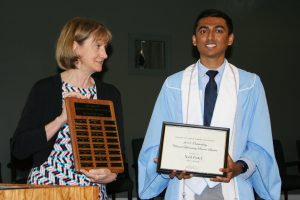Neil Patel ’18 trained as a clinical laboratory scientist but never imagined he’d work with a team of scientists and researchers to fight the spread and intensity of the global pandemic caused by COVID-19.

Patel, a Charlotte, North Carolina native, works as a cytometry associate at Regeneron Pharmaceuticals in Tarrytown, New York. The field of cytometry includes measuring the characteristics of cells, such as cell size and complexity. Patel said teams around the world are working to develop drugs to lessen the body’s reaction to the virus and on a vaccine to prevent the virus altogether.
Specifically, Patel works in flow cytometry, which involves the use of instruments with calibrated lasers in order for researchers to learn as much as they can about specific cells, including those affected by similar proteins found in COVID-19.
“There’s a lot of optimism,” Patel said. “There are some great people all over who are either working on the cure or helping conduct trials to repurpose current drugs. I think everyone is hopeful that either Regeneron, or any of the other pharmaceutical companies, will create something to help a lot of people.”
Patel, who is continuing work as an essential employee both from the lab and from home, said an interest in how data can be used to diagnose and develop plans influenced his desire to major in clinical laboratory science.
“That really took it home,” Patel said. “The whole field of medicine relies on data and getting results. Without that, you can’t effectively treat patients. You can rely on guesswork, but guesswork can result in fatal mistakes.”
Patel said he sees himself connected to patients, not only from hearing patients’ stories of using Regeneron drugs, but also from helping scientists develop a product that could potentially save hundreds of thousands of lives.
“I’ve always had an interest in the clinical side of things, however, slowly but surely research has become one of my passions,” Patel said.
The early work Patel and his team is doing will allow for other researchers and scientists to specifically test which antibodies in combination will be the most potent to combat the virus.
“Team-based care goes into everything,” Patel said. “Here, we see it when multiple different research groups come together to work toward acquiring accurate data in a time-efficient manner. On the hospital side of things, we see nurses and doctors working together to refine their treatment plans and to ensure quality care for patients.”
Patel also credited former faculty in the Division of Clinical Laboratory Science and other mentors as he continues to learn about the ever-changing field of clinical laboratory science and flow cytometry.
“I’ve been lucky that they’ve taken me under their wing and have taught me so much in such a short amount of time.”
The Division of Clinical Laboratory Science is housed in the Department of Allied Health Sciences.